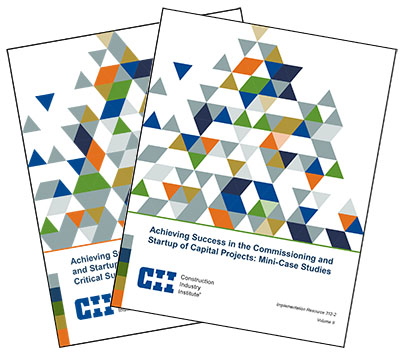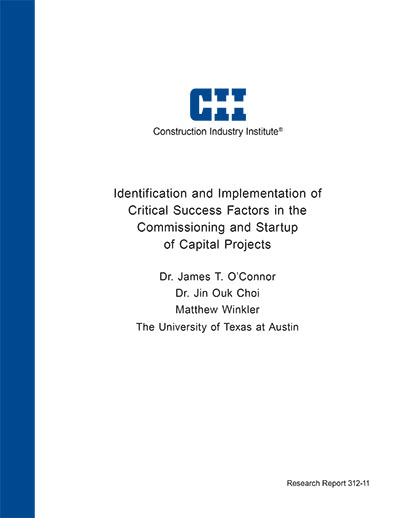
Achieving Success in the Commissioning and Startup of Capital Projects
This implementation resource provides key guidance on how project teams can help ensure success in capital project commissioning and startup. The document is intended to complement or supplement the prior recommendations and learnings from Research Team (RT) 121, Planning for Startup. CII established RT 312, Best Practices for Commissioning and Startup, to identify the best practices for commissioning and startup (CSU) that define, achieve, and maintain owner operational performance. Through surveys and interviews with CSU experts from CII member companies, the research team identified 16 critical success factors (CSFs) and then validated them through analysis of project performance and external expert feedback.
The introduction of this publication gives an overview of the research purpose and objectives, scope limitations, and research methodology. Chapter 2 presents CSU terminology, CSU phases/milestones, and CSU organizational functions. Chapter 3 defines the 16 CSFs, and discusses their recommended timing, how frequently the industry accomplishes them, barriers to their accomplishment, and their links to project safety and quality. Chapter 4 links the CSFs to the work process model presented in Implementation Resource (IR) 121-2, Planning for Startup. Chapter 5 presents a reproducible user-friendly checklist of the CSFs and innovative commissioning technologies. Chapter 6 compares the CSU performance of 26 actual projects to their levels of CSF implementation, providing validation of the CSFs, along with additional insights into both CSU performance and key indicators of CSF achievement. In Chapter 7, four case studies examine four CSU failures, highlighting missing links to critical success factors. Chapter 8 describes five innovative commissioning technologies investigated by the research team. The concluding chapter presents key take-aways from the study. The appendix provides additional ideas on how to advance CSU practice.
IR312-2, Achieving Success in the Commissioning and Startup of Capital Projects (Volume 1)
This resource provides key guidance on how project teams can help ensure success in capital project commissioning and startup and includes:
- CSU Critical Success Factor Checklist Tool – To increase industry awareness and implementation of the CSU critical success factors. The tool conveys information on critical success factors, most influential indicators of CSF achievement, timing of implementation of CSFs and innovative commissioning tools and their application timing. (p. 33)
- Distinctions between pre-commissioning and commissioning – To clarify terms pre-commissioning and commissioning (p. 7)
- A detailed discussion of the barriers to implementing laggard CSFs – To mitigate most significant barriers to CSF achievement (p. 18)
- Links between the CSU critical success factors and quality and safety – To identify how failure to implement the CSF could threaten quality and safety performance (p. 25)
- Listing of project organizational functions involved in CSU – To determine who is typically involved in CSU activities (p. 12)
- The research documented and analyzed four mini-case studies to prevent causes of CSU failures. Listed which critical success factors were not achieved or were achieved too late and identified commonly neglected CSFs and six laggard CSFs as well.



